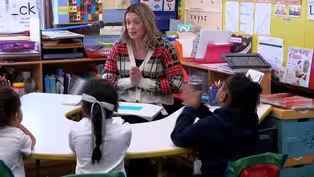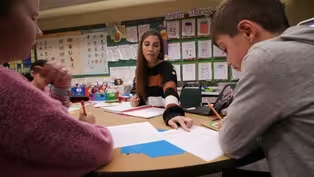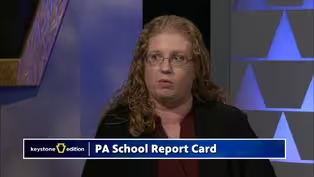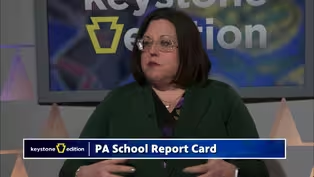Keystone Edition
PSSA - The Teacher's Perspective
Clip: 1/6/2025 | 5m 57sVideo has Closed Captions
Teachers approach the PSSAs with responsibility but acknowledge the pressure it brings
Teachers approach the PSSAs with responsibility but acknowledge the pressure it brings to students and educators. The test measures achievement and growth, helping districts identify areas for improvement. Teachers focus on data-driven adjustments and individual interventions to address gaps. Growth scores, like PVAAS, track progress, emphasizing equitable development for all students.
Problems playing video? | Closed Captioning Feedback
Problems playing video? | Closed Captioning Feedback
Keystone Edition is a local public television program presented by WVIA
Keystone Edition
PSSA - The Teacher's Perspective
Clip: 1/6/2025 | 5m 57sVideo has Closed Captions
Teachers approach the PSSAs with responsibility but acknowledge the pressure it brings to students and educators. The test measures achievement and growth, helping districts identify areas for improvement. Teachers focus on data-driven adjustments and individual interventions to address gaps. Growth scores, like PVAAS, track progress, emphasizing equitable development for all students.
Problems playing video? | Closed Captioning Feedback
How to Watch Keystone Edition
Keystone Edition is available to stream on pbs.org and the free PBS App, available on iPhone, Apple TV, Android TV, Android smartphones, Amazon Fire TV, Amazon Fire Tablet, Roku, Samsung Smart TV, and Vizio.
Providing Support for PBS.org
Learn Moreabout PBS online sponsorshipthey've already been there and done that.
They've already dug in to kind of see, you know, how did we do, how did my students do, what did we do that worked?
And then the data's released and it's, you know, the expression we've heard a million times, a deep dive into the data.
- Yeah, right.
- To really start to discover, you know, what we need to do better as we move along and what do individual students need as we move along.
- And then you make curricular adjustments from that.
- Right.
- So you look and you start looking historically at, well, why do we always not get something right?
What are we doing here that we're not getting kids to understand that concept?
When I talked about eligible content and assessment anchors.
So then what curricular adjustment do we need to make so that we're making sure that kids have more exposure to that or a deeper understanding of that so that they're able to master that skill.
So you've heard their expression, data-driven decision making before, you're doing that at a district level from a curricular standpoint, but then teachers are doing that on the student level, looking at what each particular student needs.
In the video that Sarah shot, they talked about like interventions and meeting the kids on their levels.
That's where you build that time into the school day.
So I might need one thing and Greg might need something else.
And you have to make sure we're both getting what we need so we can move on.
And that we can keep making progress in the district.
And I think the other big thing to concentrate on is when the scores come out, there's two different scores.
So you have an achievement score, which is kinda like a traditional grade that we're all used to getting, but then you also have a growth score and they call that PVAAS, which is the value added assessment system.
But it looks at, did that child from the last time they took the test to this time show a year or more worth of growth?
And in an urban school district, especially where I have deficiencies and I don't have readiness and I have a lot of other societal issues that are coming in, ensuring that my kids are growing is really, really important.
Especially as we're doing everything we can to strive to get to that achievement level.
- And the growth really isn't only the lowest level students, right?
So the growth is from, you know, top to bottom.
We're looking for every student to have that growth.
And it's a growth mindset.
We all try to have that.
- I don't wanna get too numbers happy 'cause everybody can look at numbers a different way, but I know we do have a little bit of a graphic here that Sarah found in her reporting, kind of where numbers were in 2019 versus 2021 versus 2024.
And I'll just give a copy there.
What exactly are we looking at here, Sarah?
Could you walk us through this just a bit?
- [Sarah] Yeah, so these are statewide proficiency rates.
So I looked at the 2019 numbers because it was the last kind of normal school year, you know, before the pandemic happened in 2020.
So we have the rates for then.
The PSSAs were skipped in 2020.
We have the rates from the first year back in 2021 and then 2024, those tests were taken this spring and the scores were released this fall.
So you can see that, you know, in most of the areas, we are starting to see growth, we're seeing some of that learning loss, you know, be eliminated.
We are really seeing growth, you know, across the board and in NEPA school districts.
- [Julie] And I want each of you to also take a look at these.
Obviously this is not school district-related, but what do you see when you look at these numbers?
- I think that, like when I look at this and you look at, okay, by 2019 we had the train on the tracks and we were going in the right direction and people were doing a good job and trying to get kids to do better than they did, 'cause if you go back and look at the scores from like '13 and '14, you could see that they kept going up.
The train came off the tracks during COVID, but everything came off the tracks during COVID.
I think we have the train back on the tracks again, but we're still trying to catch up that gap.
And that gap that happened was different for every kid depending on how long they were out and did they get sick and were they quarantined and what exposure did they have?
But at the same time, there was also a historic investment in education through the ARP ESSER's dollars where schools were really able to invest in before and after school tutoring, during the day tutoring, building in additional interventions, systemic summer programming.
And what scares me the most when I see those scores is that we have from 2019 brought those start... We're moving the right way, but the ARP ESSERs dollars expire this September.
So I worry that some of that programming that has helped us close that gap is going to go away with that funding no longer being part of what we had to access.
- Before we take a quick break, I'd like to get your thoughts as well, Greg.
- Yeah, so as we returned after school districts were closed down due to COVID, one of the things that I think we all battled was trying to figure out when we return, how can we make this seem as normal as it could be?
How can we return to normalcy and not pretend that we're ignoring what just happened?
So there was this fine line of trying to acknowledge what we just went through, address the needs that were evident, but also have kids return to some sort of normalcy.
For districts that I think succeeded with that, they maintained a focus.
So when students came back, we tried not to admire our problems.
We knew they existed, we tried to stay focused, we tried to keep our eye on the things that we felt were important for students to achieve and for students to grow, but at the same time, invest in the ways that we could to address the problems, but try to have some normalcy.
What kids, I think, craved and wanted when they returned was to stop talking about it on a lot of levels.
That's not to say that they didn't even know, they may have had their own issues, but I think they all wanted to come back and have it be like it was.
And I think what I would add to that is, you know, all of us sitting around this table, I think without any hesitation, you know, if I snap my fingers and said, "Name your favorite teacher, we could all do that."
- [Julie] Yeah.
- I think they wanted to come back and be inspired.
I think they craved those relationships.
Improving PSSA Scores and Getting Students Back on Track
Video has Closed Captions
Clip: 1/6/2025 | 2m 49s | WVIA News dives into the lasting effects of COVID-19 on student learning (2m 49s)
PA School Report Card - Preview
Preview: 1/6/2025 | 30s | Watch Monday, January 6th at 7pm on WVIA TV (30s)
Tactics for Improving PSSA Scores
Video has Closed Captions
Clip: 1/6/2025 | 7m 17s | The PSSAs are seen as a valuable tool among many for fostering student success (7m 17s)
Video has Closed Captions
Clip: 1/6/2025 | 4m 21s | These summative assessments measure knowledge against state standards. (4m 21s)
Providing Support for PBS.org
Learn Moreabout PBS online sponsorship
- News and Public Affairs

Top journalists deliver compelling original analysis of the hour's headlines.

- News and Public Affairs

FRONTLINE is investigative journalism that questions, explains and changes our world.












Support for PBS provided by:
Keystone Edition is a local public television program presented by WVIA



